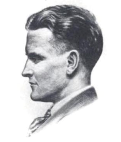The Great Gatsby by F. Scott Fitzgerald
Page 5 of 25 - 1 2 3 4 5 6 7 8 9 10 11 12 13 14 15 16 17 18 19 20 21 22 23 24 25 Purchase full notes for £6.95 (aprox $10.84)
And yet Gatsby’s ‘blue lawns’ do, to an extent, break down Nick’s native resistance to difference and introduce him to the delights of inebriating ambiguity; and Gatsby is precisely one of those born without the ‘advantages’ of a ‘city where dwellings are still called through decades by a family’s name’ (183), and, therefore, if Nick is to follow his father’s advice, he should be slow to judge him. Away from the certainties of pure Mid-Western snow, judgement is always a matter of perspective in The Great Gatsby . Nick’s final approval of the central character is seen by Tom Buchanan as a failure of perspective: ‘He threw dust into your eyes just like he did in Daisy’s’ he says to him on page 186, and, ironically, ‘foul dust’ is the term Nick uses to describe Tom and Daisy and the others who surround the man he chooses to label as great.
T. J. Eckleburg’s giant spectacled eyes loom over the darker reaches of the novel as a kind of parodic intimation that all our attempts to reach a satisfactory judgement of human affairs are likely to fail. George Wilson, in his demented state, associates these ‘yard high’ ‘retinas’ with the vision and judgement of God, and then proceeds to murder an innocent man on the basis of a completely distorted view of events. Nick seems to recognise the fundamental relativity of judgement when he decides to shake Tom’s hand, despite everything that has happened: ‘I couldn’t forgive him or like him, but I saw that what he had done was, to him, entirely justified’ (186).
Fitzgerald presumably wishes the reader to connect Eckleburg’s giant spectacles with those of the unnamed ‘Owl-eyes’ whom the reader first encounters as one of those many guests at Gatsby’s parties who are attempting to uncover the hidden secrets of their host. While most are satisfied in this respect by passing on the most ludicrous tittle-tattle that can be imagined about a man supposedly a ‘nephew or a cousin of Kaiser Wilhelm’ (38), ‘Owl-eyes’ forensically examines his library, discovering that it contains real books (though not ones that have been read, as the pages are uncut). Owl-eyes embodies, perhaps, the whole theme of judgement, peering into the life of another person and scrutinizing what is there. Ironically, he is the only guest apart from Nick to appear at Gatsby’s funeral, repeatedly wiping his ‘thick glasses’ so that he can see clearly in the rain. His final judgement on Gatsby is one of the last statements about the man that Nick records: ‘ “The poor son-of-a-bitch,” he said’ (182). In direct response, perhaps to the second appearance in the novel of Owl-eyes’ ‘thick glasses’, Nick continues to speculate on the inadequacies of perception: ‘After Gatsby’s death, the East was haunted for me […], distorted beyond my eyes’ power of correction’ (183).

